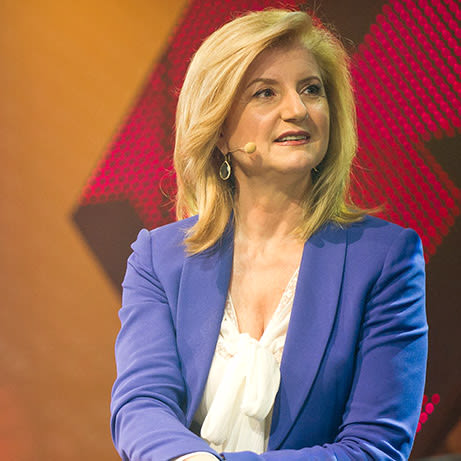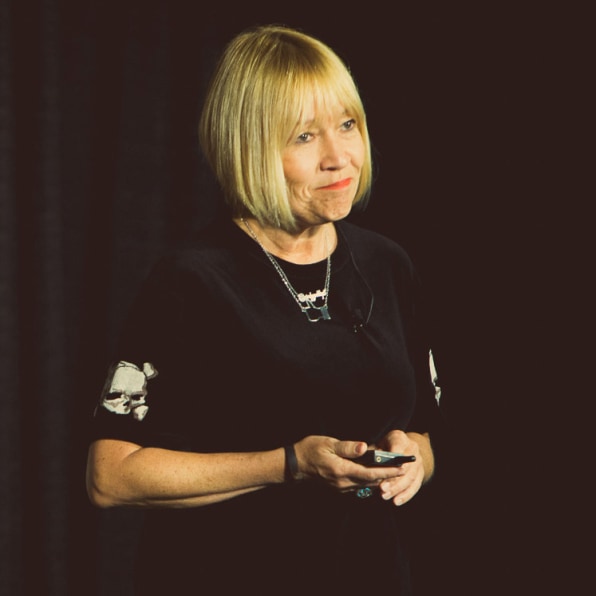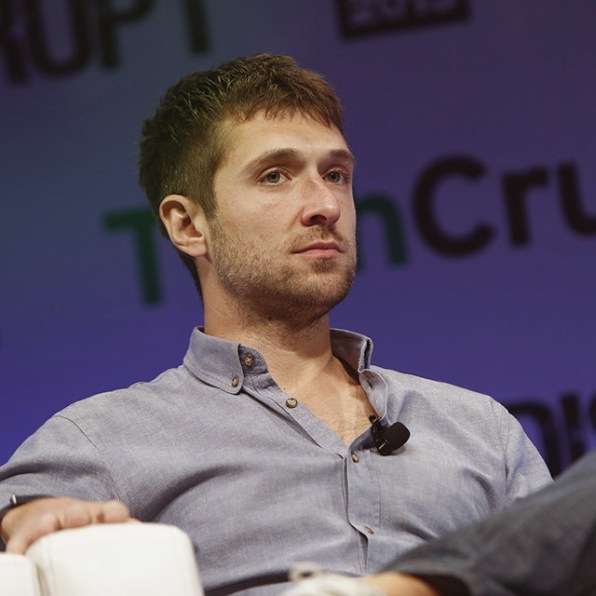11 Famous Entrepreneurs Share How They Overcame Their Biggest Failure
The most successful people are the ones who take big risks, which often means spectacular flameouts. We asked entrepreneurs who are at the top of their game how they coped when major failure smacked them in the face.
In order to achieve greatness, you have to fail greatly.
The most successful people will tell you that at some point in their careers, they thought they were going to fail. Not because they didn’t have enough confidence in themselves, but because they had risked everything.
The difference between these successful people and those we never hear about again is that the former kept going.
Arianna Huffington learned early on that failure is needed in success.
Aaron Schildkrout, cofounder of HowAboutWe.com, even learned how to fail more quickly.
Here’s what 11 successful entrepreneurs did when failure hit them in the face–hard.

ARIANNA HUFFINGTON, COFOUNDER OF THE HUFFINGTON POST
“I failed, many times in my life. One failure that I always remember was when my second book was rejected by 36 publishers. Many years later, I watched HuffPost come alive to mixed reviews, including some very negative ones, like the reviewer who called the site “the equivalent of Gigli, Ishtar, and Heaven’s Gate rolled into one.”
“But my mother used to tell me, ‘failure is not the opposite of success, it’s a stepping stone to success.’ So at some point, I learned not to dread failure. I strongly believe that we are not put on this Earth just to accumulate victories and trophies and avoid failures; but rather to be whittled and sandpapered down until what’s left is who we truly are.”
KATHRYN MINSHEW, FOUNDER AND CEO OF THE MUSE
In 2011, Minshew woke up one morning to find that she couldn’t log into PYP Media, a site that she had built–and put her entire life savings into. She says that’s when her life fell apart:
“A disagreement between the four [cofounders] turned into a nasty power struggle that put me and Alex [Cavoulacos], my current Muse cofounder, at the receiving end of screaming threats, and I woke up one morning to find my website access, as well as that of Alex and our entire team, shut off. I felt completely humiliated, like I had failed them and myself. I also ended up losing the entire life savings I’d put in the company–about $20,000. We could have sued, or we could have started over. We chose the latter.”
“Every single person other than two of my former partners left PYP Media in July 2011 to start The Muse, and in our first month, we had more people visit the site than in the history of PYP. We build a much stronger product, raced ahead with a clear sense of purpose and were accepted into Y Combinator several months later. We’ve raised well over $2 million in venture and angel funding to date and reached over 15 million people. In many ways, that first failure was the best thing that ever happened to me.”
AARON SCHILDKROUT, COFOUNDER AND CO-CEO OF HOWABOUTWE.COM
“HowAboutWe’s early days were filled with constant thoughts of failure. Thousands of startups, not to mention dating sites, fail every year. Practically every dating business created in the last 10 years has failed. The odds were against us–resoundingly.”
“But the idea of creating something out of nothing, something millions of people could use to find love, was worth facing failure for. So we learned to fail more quickly, pushing through bad ideas to arrive at great ideas. That’s ultimately what propelled us forward (and continues to do so): learning and failing quickly, and never making the same mistake twice.”

CINDY GALLOP, FOUNDER OF MAKELOVENOTPORN AND IFWERANTHEWORLD
“I’m prone to saying that every situation in business and in life can be summed up by a quote from Macbeth, and in this case I’m with Lady Macbeth: ‘We fail? But screw your courage to the sticking post, and we’ll not fail.’”
“So I’ve looked failure in the eye, and just kept right on going. Or, as Ben Horowitz says in his book The Hard Thing About Hard Things: Building A Business When There Are No Easy Answers: ‘Whenever I meet a successful CEO, I ask them how they did it. The great CEOs tend to be remarkably consistent in their answers. They all say, ‘I didn’t quit.’
SCOTT ADAMS, CREATOR OF THE DILBERT COMIC STRIP
“I go into most risky projects (and those are the type I prefer) with two contradictory thoughts: one, this sort of thing is unlikely to succeed and two, this will totally succeed.”
“I hold both thoughts until the last dying gasp of a project. I can’t think of a time I thought I would fail without simultaneously thinking I would pull a rabbit out of the hat at any minute.”
“But that’s just me. I’m an irrational optimist.”
CHRISTINA WALLACE, CURRENT VICE-PRESIDENT OF BRANDING AND MARKETING AT STARTUP INSTITUTE AND FORMER COFOUNDER OF QUINCY APPAREL
After her startup Quincy Apparel with former Harvard Business School classmate Alex Nelson shut down, Wallace stayed in bed for three weeks. She tells Fast Company about that hard period of time:
“At this point there weren’t any levers left to pull: going without my (measly) salary wouldn’t make a dent and my credit card limits weren’t close to enough to float us until the next season launched. One of the difficult parts of fashion is the cyclicality of sales around the seasons–and the cash required to launch the spring season was far more than we had left. I took a train from the Valley up to San Francisco and met with two mentors, who agreed that it was the end of the road for Quincy. After it was all over I spent three weeks straight in bed. Then after 21 days of sleeping, crying, I put on my big girl pants and rejoined the world.”
“And I learned to be as open about my failure with my friends and family as I was willing to be about my successes. Startups are not just what you read in the press. The real story is much more volatile and human, and we do our community a disservice pretending otherwise. I don’t celebrate failure for failure’s sake, but I think there is something amazing about trying to do something at the edge of possibility and potentially failing at it. Senator McCaskill recently said at a Politicoconference that ‘winners are those who are willing to lose.’ I really like that mentality.”

BEN LERER, COFOUNDER AND CEO OF THRILLIST MEDIA GROUP
“During the last nine years building Thrillist Media, of course there were times when I realized pieces of the business or certain strategies weren’t working. My approach is always to admit as early as possible that the approach is failing and work to resolve the situation, without letting it drag on.”
“I’ve had to make some really tough decisions but ultimately, I think the best companies are those that can recognize when something isn’t going right, and fix it, instead of just turning a blind eye because it’s easier.”
DAVID LUCATCH, FOUNDER AND CEO OF YAPPN CORP.
“There have been times in my career when I thought I was going to fall short, most recently during the early days of Yappn in 2013. By July, the company was in a stalemate, despite all my hard work. During these trying times, I poured all my energy and focus into doing whatever it took to succeed and leading my team by example.”
“As the CEO, when you make the biggest commitment, work the hardest and run the fastest–your energy becomes contagious and everyone around you is inspired to double down and make it happen. Now, almost a year later Yappn is gaining tremendous market share. Learning through failure does not only require vision, it also requires tenacity to turn opportunity into success. That’s how I got the nickname the ‘Bulldog.’”
MEREDITH FINEMAN, FOUNDER AND CEO OF FINEPOINT DIGITAL
“As an entrepreneur, that thought isn’t one that comes once and leaves. At first it’s loud and clear like a bullhorn, because you feel alone and like you have no idea what you’re doing. But as you continue, I’m now three years in, the idea of failure is more of a hum in the background.”
“It’s always an option. I’ve thought I was going to fail many, many times. Each of those times is when I rely on mentors and friends to discuss crawling my way out. There are more quantitative failures, which happen all the time–where you have to be careful is not letting it affect your sense of self and self-worth. I think if you can shield yourself from that, it helps a lot. But it’s not easy to do.”
BENNY LUO, SERIAL ENTREPRENEUR, FOUNDER OF NEXTSHARK, NEWROCKSTARS, DISCOVERME, AND THE OTHER ASIANS
“Before I found success in my first company, I dabbled in many ‘get rich’ ventures, including network marketing, online poker, and affiliate marketing. While I did find some minimal success, all of these ventures eventually turned into failures. But, one day I realized that after each failure, I always gained some valuable knowledge of things I could apply to or avoid in my next project. That was the attitude I adopted after every failure from then on, I focused on what I gained instead of what I lost, because that’s what really matters in the end.”
JOANNE LANG, FOUNDER AND CEO OF ABOUTONE.COM
“It’s no secret that I’m a first-time entrepreneur. I had to learn quickly, and the hard way, that what people term ‘failing’ has to be considered learning, and you need to embrace it. I also had to learn that if you are not feeling the emotion of failing, you are not trying enough new things or stretching yourself as far as you can. This can be emotionally tough so you need a set of advisors around you that believe in you and support you no matter what. Finding those advisors is key to success, and it’s their support that will keep you moving forward. I had to learn that my greatest failure could be not aiming high enough, or not trying in the first place.”
—Vivian Giang most recently launched the entrepreneurship vertical at PolicyMic where she recruited, edited, and brainstormed story ideas closely with writers. Prior to that, she launched the careers vertical at Business Insider focusing on the evolving office, growing industries, and how technology, education, and the rise of freelancers play a role in the future workplace.

